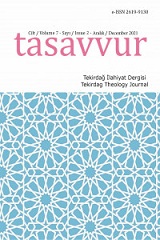Şems-i Sivâsî’nin İrşâdü’l-Avâm Adlı Mesnevîsi Bağlamında Müteşeyyih Kimselere Dâir Görüşleri ve Değerlendirilmesi
Comments of Shamsuddîn Al-Sivasî about False Sheikhs under the Light of His Work İrsâd Al-'Avam and Evaluation
Author(s): Yüksel Göztepe, Fatih ÇinarSubject(s): Theology and Religion, Islam studies, History of Islam
Published by: Tekirdağ Namık Kemal Üniversitesi İlahiyat Fakültesi
Keywords: Tasawwuf; False Sheikhs; True Guides; Psychology of Deception; Shamsuddīn al- Siwāsī; Irshād al-'Awām;
Summary/Abstract: Shamsuddîn al-Siwāsī is the founder of Sivāsiyya branch, which is of the main branches of the Halwatiyya order. Siwāsī, who left deep traces in the scientific, political, cultural and religious fields of the sixteenth century, first wrote a work entitled Irshād al-'Awām after he migrated from his hometown Zile to Sivas, and in this study he discussed the guides of the spiritual journey that he observed in his period and thought to be abused from time to time, under the titles such as the correction of the soul, the necessity of the perfect master, the characteristics of the masters and their functions in self-correction. As it can be understood from the title of the work, Siwāsî aimed to warn those who were deceived by the shape and fell for fancy words and took those who occupied the office of sheikhdom even though they were not worthy (competent) as their guide, since they did not know the subtleties of the spiritual course. In line with this aim, Siwāsī revealed the deviations of the false sheikhs in creed, practice and moral issues with verses, hadiths, stories he narrated and various metaphors he used. He stated that the position of sheikhdom/Murshid al-Kāmil was extremely important at the point of exploiting the mystical system and contributed to the criticisms and warnings made against the abuse of this position from the first periods. In this sense, he became one of the sixteenth-century representatives of a tradition such as Hasan al-Basrī, Imam Al-Ghazālī, Ahmad Yasawī, Mawlānā, Najmaddīn-i Dāye and Kashani that warned about false sheikhs. The determinations, warnings and solution suggestions made by Siwāsī as a sheikh on this subject, which has become a subject of discussion on various occasions today, are important. This article mentions the views of Siwāsī on false sheikhs, and also points out his similar and different aspects with the people who expressed their opinions on this subject before him. The current study emphasizes the position of this tradition, which can be considered as an internal criticism tradition in Sufism, with the evaluations of Siwāsī on false sheikhs, among the names before and after him.
Journal: Tasavvur Tekirdağ İlahiyat Dergisi
- Issue Year: 7/2021
- Issue No: 2
- Page Range: 1109-1144
- Page Count: 36
- Language: Turkish

